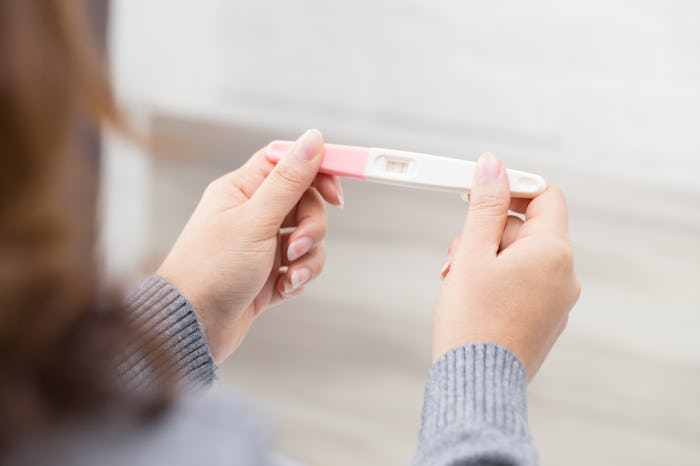Life

Here's How Spotting Affects The Results Of A Pregnancy Test, According To Experts
Whether you're trying or not, when you suspect you might be pregnant, you want answers — like yesterday. Unfortunately, common pregnancy symptoms like fatigue, cramping, and breast tenderness are also run-of-the-mill symptoms women experience for other reasons (three letters: PMS). If you're spotting and not sure what to attribute it to, can you even trust the results of a home pregnancy test? Can spotting make a pregnancy test inaccurate?
At-home pregnancy tests pick up the presence of a hormone called human chorionic gonadotropin (hCG) in your urine or blood, according to the Mayo Clinic. The placenta produces hCG upon implantation, when the embryo attaches itself to your uterine lining, and the amount of hCG dramatically increases during early pregnancy. Implantation occurs about seven to 14 days after conception, and some women will experience light bleeding around this time, according to What to Expect. Light bleeding or a pinkish or brown discharge associated with implantation is not a cause for concern. It's just the result of the embryo bursting some tiny blood vessels as it settles into place in the uterus.
Spotting can't make a pregnancy test inaccurate, but Dr. Gerardo Bustillo, M.D., OB-GYN at MemorialCare Orange Coast Medical Center says user error can. "False-positive tests, although uncommon, are possible," he said. "Possible reasons include operator error, interference from hCG administered as part of infertility treatment or in certain diet programs, tumors secreting hCG, and when hCG is secreted by the pituitary gland, typically in perimenopausal women."
Fertility specialist Dr. Aimee D. Eyvazzadeh, M.D., MPH, says that hCG-containing fertility medications used to trigger ovulation can cause false-positive pregnancy test results. "Medications used to trigger ovulation that contain hCG, such as Ovidrel, will cause false-positive results," she says. If you're using Pregnyl, Ovidrel, or Noveral, you should wait at least two weeks to allow the hCG from these medications to clear from your body before being tested, explained Verywell Family.
False negatives are also possible, he says. A common cause for a false negative pregnancy test result is testing too soon after conception — which is likely for women with a history of irregular menstrual cycles, says Bustillo.
And even though an early urine pregnancy test can show positive results as early as three to four days after implantation, it is more likely to show a positive result about a week after your missed period, when the hCG levels in your urine are higher, noted Mayo Clinic. At this point, implantation spotting would have occurred already. Bustillo recommends waiting at least two weeks after sex before using a home pregnancy test.
If you are skeptical of the pregnancy test results due to spotting, you may consider testing again. Before you go out and buy another test, Bustillo recommends reading the box. Although he says more expensive tests are not necessarily superior, they do tend to have longer shelf lives. “Home pregnancy tests, like medications, have an expiration date,” he says. “All pregnancy tests last approximately two to three years once produced. Typically, the less expensive pregnancy tests have a shorter shelf life.”
Tests also vary in their level of sensitivity for detecting hCG. Going to your doctor's office for a blood test is the best way to get definitive results. Inaccurate results are very rare with tests ordered by the doctor, Bustillo explains. "Many physicians order serum, or blood, pregnancy tests, which are more accurate than urine tests," he says. If you believe you are pregnant, and are experiencing cramping or spotting, it's a good idea to contact your physician and rule out any complications.
Experts:
Dr. Gerardo Bustillo, M.D., OB-GYN at MemorialCare Orange Coast Medical Center
Dr. Aimee D. Eyvazzadeh, M.D., MPH, fertility specialist and reproductive endocrinologist
This article was originally published on